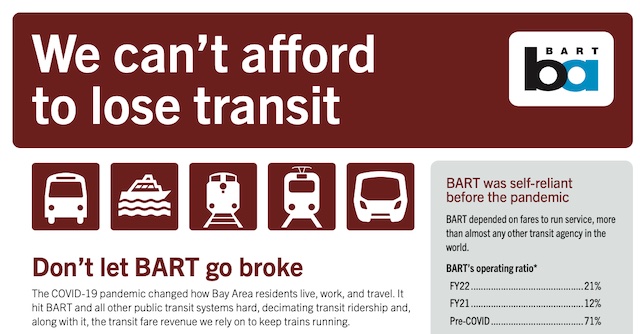David Zipper, who has a master’s degree in urban planning, writes on Vox about how transit agencies need to save themselves from a fiscal cliff. To do so, he says, they must “secure new and reliable revenue streams from state and regional sources.” To convince skeptical members of the public they need to provide those revenue streams out of their taxes, agencies need to “demonstrate an ability to replace car trips, not just serve economically disadvantaged people,” because only by replacing car trips can they prove they are “curtailing congestion, reducing auto emissions, and boosting economic growth.”
BART’s plea for more subsidies falsely claims that “BART was self-sufficient before the pandemic” when its own data show that fares covered only 71 percent of operating costs and zero percent of capital costs.
Yet Zipper never really says why we need to save transit. He claims that transit has been “indispensable” for major metros, but what he really means is that it is indispensable for major downtowns such as Chicago, Philadelphia, and San Francisco. In reality, the only metro area for which transit is truly indispensable is New York, and if it is so indispensable there, then New Yorkers should be the ones to pay for it.
Much of the evidence Zipper cites comes from the transit agencies themselves. “The Bay Area’s BART recently created a public website titled ‘Financial Crisis’ to draw attention to its plight,” he observes. “‘We can’t afford to lose transit,’ it proclaims. ‘Don’t let BART go broke!'” Just because BART doesn’t want to go broke doesn’t mean that the San Francisco Bay Area needs BART.
Outside of New York, transit mainly served downtowns, and the supposed indispensability of transit greatly declined after COVID emptied out downtown office buildings. Zipper assumes that, if subsidies to transit are increased, ridership will be restored. But he doesn’t account for the fact that ridership is down because most of the former riders are now working at home and don’t need transit.
The United States has the best transportation system in the world as evidenced by the fact that Americans are far more mobile than the residents of any other country, traveling 15,000 miles a year by auto and 2,000 miles by airliner. That mobility gives people access to better jobs, better housing, and lower-cost consumer goods. Transit plays almost no role in this system: the average American rode transit just 165 miles in 2019, and less than 100 miles per year since the pandemic.
The 2021 American Community Survey found that 92.0 percent of U.S. households had at least one car — nearly 60 percent had two or more — and that’s an increase from 91.4 percent representing 308,000 more auto liberated households since 2019. The survey also found that 95.9 percent of workers live in a household with at least one automobile (which means that roughly half of the households with no autos have no workers in them). Of the workers whose households have no autos, more than a quarter drive alone to work, mainly in employer-supplied vehicles, so only 3 percent of American workers truly have no access to an auto.
Zipper doesn’t even care about that 3 percent. He wants transit to be subsidized enough to attract workers out of their cars, in other words out of a low-cost, speedy form of transportation into a high-cost slow form. What is the point? Every other industry in the world has to cut costs when its revenues decline. Why should transit be exempt?
People like Zipper need to realize that transit no longer makes sense in today’s world, and if transit agencies want to remain relevant, they will have to completely reinvent their business models, not merely propagandize the public with false claims about transit’s indispensability.









living in an around the boston area and interacting with many disciplines over the years, i came up with a working theory: whenever you see policy that seems out of step, downright obtuse, or actively causes harm, look for the harvard connection.
i think it’s something in the charles river that doesn’t quite make it to mit.
he’s got a bigger problem with the sale: the mbta is a hopelessly broken organization from years of mismanagement and now the inability to attract workers.
the thing that makes the most fiscal sense is to shrink the system to serve the population that needs it most, while ridership remains down 40%, instead of subsidizing the wealthiest suburbs with the remnants of the streetcar systems that built them.
the commonwealth seems concerned that net 100K are no longer members. i think it’s the tip of the iceberg.
“BART’s plea for more subsidies falsely claims that “BART was self-sufficient before the pandemic”
Sloppy. No it doesn’t.
FantasiaWHT,
Actually, the quote from the document pictured above is “BART was self-reliant before the pandemic.” I said “sufficient” but does “self-reliant” have a meaning that is any different from “self-sufficient”?
https://twitter.com/lowkell/status/1642894035663691776?s=42
Gee, wonder why America’s addicted to oil? Actually, we got addicted to oil in large part because we foolishly put most of our transportation resources into building highways/roads instead of focusing on high-speed and other passenger rail. https://bluevirginia.us/2023/04/monday
lol I can’t think of a worse mode of transportation than passenger rail. It literally takes you no where other than between train stops.
Schit for brains….
Quick search I to a trial energy…
energy use by type/source.
Vs. USA
Pretty much the same
USA: 37% energy derived petroleum
Germany: 35%
EU: 37%
50 years, trillions subsidies
Achieve nothing
The fundamental problem with transit is that at the core it doesn’t need to provide good service. Other than a handful or so of transit agencies, 99% of their operational and capital money comes from politicians. Unless the politicians become hyper focused on quality service, it ain’t happening.
Friend took the train the other day. Downtown was awash in the smell of fentanyl smoke and urine, and someone dropped a deuce on a train seat.
Trains are so great.